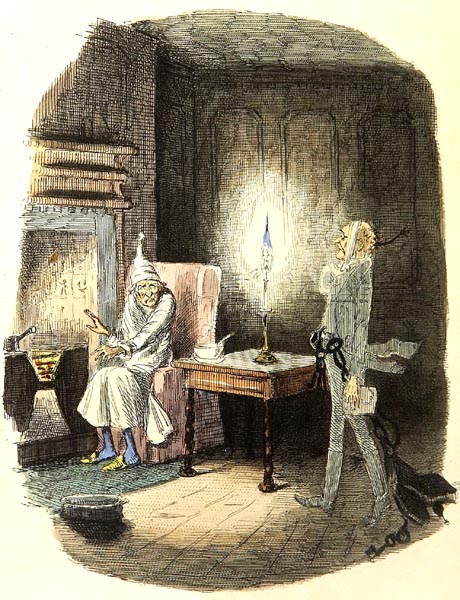 |
| Many a miser has been called by this guy's name: Scrooge (Wikipedia) |
Note: Allusions are a kind of "cultural shorthand," and they're commonly found. Some allusions refer to famous characters, places, or events; others are half of a well-known saying.
Get Ready: What do you think it would mean if someone called you "a regular da Vinci" or "a real Dracula"?
Jake, an American, and his Chinese friend Ginny are opening their paychecks.
Ginny: Wow! Another bonus! I think our boss is really generous, don't you?
Jake: Yeah. You know what they say about a fool and his money.
Ginny: What?
Jake: You know, "A fool and his money are soon parted." It's a proverb.
Ginny: Oh. I see. So you think our boss is a fool?
Jake: Nah, he's OK. At least he's not like my last boss. That guy was a regular Scrooge.
Ginny: Who?
Jake: Ebenezer Scrooge. He was a mean boss in a story by Charles Dickens.
Ginny: Oh, I get it. But why do you keep talking in riddles?
Jake: Ha! They might seem like riddles, Ginny, but they're just allusions. They're a really common way of talking, a kind of "cultural shorthand." I think you do it in Chinese, too.
Ginny: Oh, yes, all the time. But that's easy for me, because I know my culture.
Jake: Yeah, I guess the only way to deal with the problem is to gain more cultural knowledge. Anyway, enjoy your bonus.
Ginny: Yes, I will not look it in the mouth.
Jake: Nice try!
Jake's right: Allusions are a kind of "cultural shorthand," and they're commonly found.
An allusion might include a brief mention of people or events from literature or history, as when Jake mentioned "Scrooge."
Another type of allusion is the use of just part of a common saying, as Jake does when he states only half of the proverb. (Ginny tries this--without much success--in referring to the expression "Don't look a gift horse in the mouth.")
There are two steps to appreciating an illusion.
Step one is to recognize that there is an allusion. If something that you are reading mentions a name or a place that you're not familiar with, it may be enough to simply look it up. "His grandfather was Napoleon." That's no allusion; it's a direct reference.
But "My grandfather was a little Napoleon around the house." That's an allusion. It's the "tip of the iceberg": You have to know that Napoleon was famous for being overbearing and dictatorial to understand what's being said.
And that's the second step in understanding allusions: After you know they are there, you have to know what they mean. And a dictionary will seldom tell you this. Napoleon's famed aggressive attitude is something you would have to know from general cultural knowledge.
How can you build up such knowledge? Read as much as you can. Watch films. Immerse yourself in Western culture. It may take years, but at last, you will catch most of the allusions that come your way. People will consider you a regular Socrates!
--------Read more: https://en.wikipedia.org/wiki/Allusion
Practice: In 1-5, what name can you use for people with these characteristics?
- a great writer
- a rich person
- a smart person
- a great dancer
- a person who's too aggressive, like a pushy boss or teacher
- Einstein
- Hitler
- Michael Jackson
- Shakespeare
- Jeff Bezos
- If you can't stand the heat...
- It takes a thief...
- Many hands...
- If at first you don't succeed...
- The love of money...
- "The best things in life are free."
- Someone who is familiar with a problem is the best one to fix it.
- If you get a lot of people working on a job, it will be easier for everyone.
- Don't keep trying to do something you are unable to do.
- Keep trying until you finish something.
Answers are in the first comment below.
Submitted to the Shenzhen Daily for October 9, 2007
This lesson received 1582 visits on my old site between February, 2012, and June, 2021.


Answers to the Practice: 1. d; 2. e; 3. a; 4. c; 5. b; 6. i; 7. g; 8. h; 9. j; 10. f
ReplyDelete